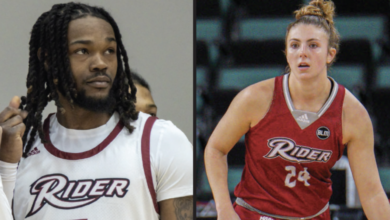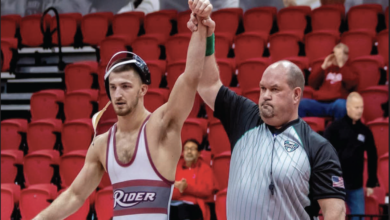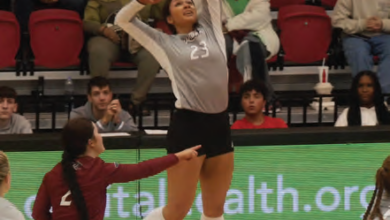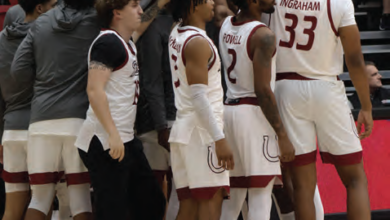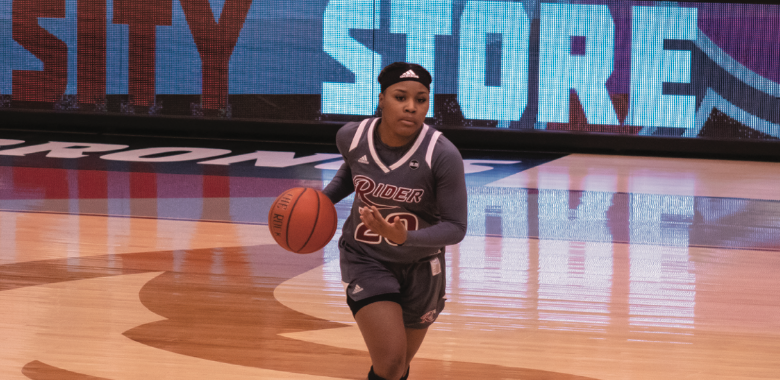
Rider athletes speak on NIL’s Impact
By Carolo Pascale
College athletics across the United States changed forever on July 1, 2021. Student-athletes in
every college and division rejoiced with the NCAA’s adoption of a new name, image and likeness (NIL) policy, allowing college athletes to reap the benefits of endorsement opportunities and sponsorships.
This change in the NCAA’s NIL rules has been lurking in the background of college athletics for a long time, going back to the moment the term “student-athlete” was coined in the 1950s.
The new rules state that any college athlete can engage in NIL activities based on the state laws of their college; they can engage in NIL activities even if that state has no NIL laws, use professional services providers and require the athlete to report any NIL activities to their college.
The big question is how this affects Rider. Since New Jersey has no NIL laws — although one is potentially planned for 2025 — it is up to Rider to decide on the NIL rules for its student-athletes.
“We do have a policy that we developed over the summer,” Rider’s NCAA Compliance Officer Greg Busch said. “Basically, the NCAA passed on coming up with formal policies at the national level for the NIL. So they pushed it onto the individual institutions to come up with their policies as to how they would manage NIL.”
With Rider and other colleges developing their NIL policies, the NCAA has seemingly provided little guidance on what is okay and what is not.
“The limited guidance that the NCAA has provided does say, and it’s in our policy too, that you can’t promote anything that is related to gambling, adult entertainment, alcohol, drugs, kind of a whole litany of things,” Busch said.
Dan Lust, a sports lawyer and New York University professor who spoke with the Rider women’s basketball team over the summer, echoed this sentiment.
“We’re just going to call it a free-for-all. If you were in a state that had NIL laws, congrats, you had a little bit of guidance. But if you were now in a state that did not have any laws that were effective, like New Jersey, you have no floor, you had nothing to help you,” said Lust.
However, there are athletes at Rider that have NIL opportunities already lined up. Several students are Barstool Athletes, which is run by the controversial Dave Portnoy. One of Rider’s Barstool Athletes is senior softball pitcher Brooklyn Trujillo-Quintana.
“I was excited because I think that’s something that’s super cool. It’s an opportunity for college athletes to make money off of all of their hard work. Automatically, I was like that’s super awesome and how do I get in on it,” Trujillo-Quintana said.
“As a smaller school, we now have the opportunities to build our own fan base and bring in more not just for ourselves, but for the university and program as a whole.”
As a Barstool Athlete, Trujillo-Quintana talked about the process of becoming one and why she chose to become one.
“First off, I love Barstool,” Trujillo-Qunitana said.
“I think it’s hilarious. I think the company is awesome. There was an application process that you had to fill out talking about your sport, where you played and personal information. Then, you got an email that said [to] wait and see and send a picture of yourself playing. You had to send a screenshot of your Twitter and Instagram bio saying, “I am a Barstool Athlete.” This was the first thing that I had seen that was saying that it doesn’t matter where you go, it doesn’t matter how many followers you have.”
Another Rider athlete involved in NIL activities is senior women’s basketball player Lenaejha Evans. Evans is now the CEO of her own clothing brand called Legendary Ending.
“I think NIL will be good because a lot of student- athletes can find something they can use to brand themselves in their name. And whatever you like, as long as you follow the rules, it’d be good for you,” said Evans.
“It’s always been a plan for me even before the NIL rule came out. So when clothing brands started hitting me up to promote their brand new stuff with my name, I thought I might as well just do my own thing,” said Evans. “I’m a basketball player, so I’ll be able to brand myself, so when people ask what I do besides basketball, I could tell them I have a clothing brand.”
Evans thinks the NIL will be beneficial to those who decide to use it.
“I think a lot of female athletes should take advantage of it because that’s how you’re going to brand yourself if you’re gonna go to the next level, especially putting a brand behind your name. It means a lot, really. So I think a lot of female athletes will benefit from it,” said Evans.
Between schools, states and the NCAA all working to allow college athletes to reap the rewards of their hard work through NIL opportunities, it’s safe to say that it’s a great time to be a college athlete.
